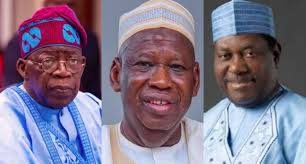Business
Nigerian Economy’ll Be 21% Digital By 2021, FG Boasts
The Minister of Communication and Digital Economy, Dr Isa Ali Pantami, has forecasted that the Nigerian economy would be 21 per cent digital by 2021.
The minister, while speaking at the Chartered Institute of Bankers of Nigeria (CIBN) 2020 Graduates’ Induction and Prize Award’s Day, yesterday, said the Covid-19 pandemic has shown the importance of the digitalisation in the growth of any country’s economy.
Pantami noted that there has never been a more urgent time to fast track digital transformation in Nigeria, saying that the digital economy drive was aimed at rapidly enhancing digital identification, broadband penetration, how bank accounts are run, etc.
While stressing the need for professionals to develop more innovative digital tools and competencies, the minister said activities in the banking, customs, and ports sectors, including revenue collections are being digitalised.
He further noted that broadband penetration at the end of July rose to over 43 per cent an almost 10 per cent increase in less than a year.
The minister said compared to the usual two per cent penetration witnessed in the years before, this is a remarkable step in the digital direction.
Pantami went on to disclose that the ministry was working to ensure that indigenous digital solution providers and entrepreneurs get preference, saying that the current administration was committed to consuming what it produces.
“The latest Quarter Two (Q2) 2020 report recently released by the National Bureau of Statistics (NBS), showed that the Information and Communications Technology (ICT) sector contributed about to 17.83 per cent to the Gross Domestic Product (GDP), from 13.85 per cent in the same period of 2019.
“Yet, the digital economy was not included in the disclosed figure. If the digital economy was added, it would have risen well above 45 per cent to GDP,” Pantami added.
Also speaking, the President and Chairman of Council, CIBN, Bayo Olugbemi, in his speech, charged professionals to take advantage of the digital economy to shape the future of the banking industry.
He said it was in recognition of the important role the banking and finance industry plays in the growth and development of the economy that the Institute decided to x-ray the topic, “Digital Economy: The Role of Professional Bankers.”
According to him, Covid-19 accelerated the pace of the digital revolution, making it imperative for Nigeria to rethink its approach to the digital economy, which has become the new normal.
He maintained that technology has caused significant disruption in the financial sector, noting that the implication of the revolution to the institution was that professional bankers need to acquire new skills, to be able to combine digital awareness with great people skills.
His words: “I believe that highly qualified, knowledgeable, skilled, dedicated, customer-focused banking professionals will shape the future of banking, as much as the new technologies that are transforming the financial-services industry will.”
Also, Olugbemi disclosed that about 1,864 candidates were admitted into the various categories of membership of the Institute, with 899 admitted into the ACIB, 41 into Chartered Banker MBA, 22 into MSc/ACIB, and 902 into Microfinance Certification programmes, cutting across countries like Nigeria, The Gambia, Ghana, Rwanda, and Sierra-Leone.
Business
Bayelsa Begins EIA On 60MW Power Plant

The Bayelsa Electricity Company Ltd, in collaboration with the Federal Ministry of Environment, on Friday, commenced the Environmental Impact Assessment (EIA) for the proposed 60-megawatt (MW) power plant.
The Tide’s source reports that the power plant project, led by the Bayelsa State Government, is in Elebele, on the outskirts of Yenagoa, the state capital.
The source also reports that the State Governor, Douye Diri, had announced plans to establish an independent power project to end the state’s reliance on the national grid and provide an uninterrupted power supply across Bayelsa.
The Director of Operations at the Bayelsa Electricity Company Ltd., Steve Bubagha Jnr., conducted the Minister of Environment, Balarabe Lawal, and his team around the project site.
Mr. Bubagha explained that the company planned to install a 60MW “plug and play” gas-fired turbine that would receive gas feed from the Oando gas manifold in Elebele.
He said the land area for the project is approximately 5.8 hectares, with 2.1 hectares currently being used.
“The Independent Power Plant is officially known as the ‘Yenagoa Power Project. This is a ‘Plug and Play’ Gas Turbine.
“What we mean by ‘plug and play’ is that the turbine is already set to be installed upon arrival from the manufacturers.
“We are only working on other components, so the turbine should be running in less than two years, or at most, in two years”, Bubagha explained.
Following the site visit, the environment minister, represented by Adimchinobi Okereke, emphasised that the purpose of the visit was to ensure the EIA process adhered to standard guidelines before granting final approval to the project.
He lauded the state government for initiating the project, noting that once completed, it would benefit Bayelsa and contribute to solving Nigeria’s power supply challenges.
Azibola Inegite, a professor and Dean of the Faculty of Science at Niger Delta University, and the EIA consultant for the project, assured that international best practices would be followed in conducting the EIA.
He emphasised that the EIA was essential for the successful execution of impactful land and environment-related projects.
On his part, the technical adviser on Print Media/Public Affairs to Governor Diri, Wisdom Ikuli, commended the Governor for his vision in executing the project.
He stated that the 60MW power plant would help reduce the state’s frequent power outages and boost business growth, thereby accelerating industrialisation.
A key part of the minister’s visit was the “Stakeholders Engagement Scoping Workshop for Environmental Impact Assessment of Proposed Gas Powered Plant and Gas Delivery Pipeline in Bayelsa State”.
The workshop brought together stakeholders from Elebele, whoch include the host community, and Kpansia, an impacted community in Yenagoa Local Government Area.
Business
Firm Unveils Solutions To Oil Logistics Challenges

A firm, Fortune Global Shipping and Logistics Limited, said it has concluded plans to unveil an excellent and cost-effective logistics solution for oil and gas logistics, project cargo, customs clearance, consolidation, and construction, among others, in Lagos State.
Announcing this in a statement on Friday, the company said the initiative would be unveiled during the 2025 Sub-Saharan Africa International Petroleum Exhibition and Conference.
It stated that the event is billed to take place in Lagos this week.
SAIPEC is an annual global event which focuses on harnessing a sustainable African energy industry through partnerships.
Fortune Global explained that the exhibition promises to engage with other key industry stakeholders, decision-makers, and experts across Sub-Saharan Africa’s energy supply and value chain.
“We invite you to experience more and find out about Fortune Global’s latest innovations in oil and gas logistics. Connect with Fortune Global Shipping and Logistics Limited at the Exhibition Booth N21, Eko Convention Centre, in Lagos”, the statement stated.
Business
Nigeria, Still Africa’s Largest Economy – World Bank

Nigeria remains the largest economy in Africa going by Gross Domestic Product (GDP), in spite of the challenges faced by yhe country’s private sector.
World Bank’s Country Director for Nigeria, Dr. Ndiame Diop, who confirmed this at the Country Private Sector Diagnostic (CPSD) and Stakeholder Engagement in Abuja, Friday, said while Nigeria receives far less Foreign Direct Investment (FDI) than its potential warrants, especially in comparison to countries like Indonesia and South Africa, it continues to hold its position as Africa’s biggest economy.
He said the CPSD report, set to be released in the coming weeks, will reveal the impact of private sector constraints on economic growth.
Diop noted that if targeted actions were taken to remove these obstacles, Nigeria’s economic potential would be significantly enhanced.
He explained that the current macroeconomic reforms have created a favourable environment for such changes.
He cited the country’s recent economic stabilization measures, particularly exchange rate market adjustments and improved access to foreign exchange, as critical steps that have already enhanced investment conditions.
The Country Director outlined four key sectors where strategic reforms could unlock massive investment and job creation.
He stayed that in the Information Communication Technology (ICT) sector, investment opportunities worth up to $4 billion could be realized, potentially creating more than 200,000 jobs.
In agribusiness, reforms could unlock $6 billion in investment and generate over 275,000 jobs.
The solar photovoltaic (PV) industry holds the potential for $8.5 billion in investment and more than 129,000 jobs, while the pharmaceutical sector could attract $1.6 billion and create more than 30,000 to 40,000 jobs.
For the ICT sector, he identified the high, unpredictable, and inconsistent right-of-way fees, levies, and informal charges, comprising 30 to 70 per cent of broadband rollout costs, as a major barrier.
According to him, addressing these regulatory inconsistencies would be a game-changer for broadband expansion.
He acknowledged that the National Economic Council has recognized this issue and that progress is being made through a World Bank-supported initiative.
He also noted challenges such as vandalism, limited financing for rural broadband expansion, and the need for competitive access to wholesale fiber.
Dr. Diop further noted that efforts are underway in collaboration with government agencies to resolve these issues, and the World Bank, the International Finance Corporation (IFC), and private investors are prepared to support broadband infrastructure development.
On solar power, Diop described Nigeria’s energy sector as difficult but noted that renewable energy access, particularly solar PV, has been a bright spot.
He explained that private sector investment in renewable energy has historically been hindered by high costs and unviable tariffs.
However, blended finance mechanisms supported by the World Bank and IFC have helped bridge this gap, making off-grid solutions more viable.
He noted the DES project, which aims to connect 17.5 million households and businesses to solar power, as evidence of growing private sector interest.
While the solar industry is expanding, he stressed that reforms to improve Nigeria’s grid electricity supply remain crucial for industrialization.
On her part, the Regional Director for Central Africa and Anglophone West Africa at the IFC, Dr. Dahlia Khalifa, stressed the importance of consistency in regulatory policies, particularly in customs duties and revenue agency fees.
She noted that unpredictability discourages private sector investment, as businesses rely on stable regulatory environments for strategic planning.
-
Nation5 days ago
Party Chieftain Hails LG Boss’ Dev Strides
-

 Oil & Energy2 days ago
Oil & Energy2 days agoOPEC+Commits To Monitoring Oil Production Adjustment
-

 Business2 days ago
Business2 days agoNigeria, Still Africa’s Largest Economy – World Bank
-

 News2 days ago
News2 days agoSoludo Rebagged FG Rice Shared To APGA Members-APC
-
Rivers5 days ago
Ohaneze Ndigbo-Group Hails Eze Umuokobo as Asst Treasurer
-

 Sports2 days ago
Sports2 days agoTennis: Alcaraz Celebrates First Indoor Title
-

 News2 days ago
News2 days agoN’Central APC Threatens To Sanction Members Attacking Tinubu
-

 online games13 hours ago
online games13 hours agoAI-Powered Advanced Leak Detection In Water Risk Management

